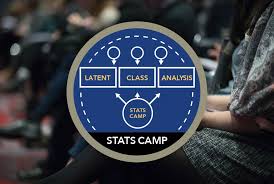Latent Class Analysis (LCA) and Latent Profile Analysis (LPA) Training Course
Latent Class Analysis (LCA) and Latent Profile Analysis (LPA) Training Course offers in-depth, hands-on instruction on advanced statistical techniques used in social science, behavioral research, public health, education, and market research.

Course Overview
Latent Class Analysis (LCA) and Latent Profile Analysis (LPA) Training Course
Introduction
Latent Class Analysis (LCA) and Latent Profile Analysis (LPA) Training Course offers in-depth, hands-on instruction on advanced statistical techniques used in social science, behavioral research, public health, education, and market research. By mastering these person-centered approaches, learners will uncover hidden subgroups within data, segment populations effectively, and apply models to inform decision-making, policy, and intervention strategies. With the exponential growth of big data and demand for sophisticated analytics, LCA and LPA have become crucial tools for researchers and professionals seeking actionable insights.
This course is tailored to equip participants with the practical knowledge and theoretical grounding to conduct LCA and LPA using cutting-edge tools such as Mplus, R, and Latent GOLD. Whether you're a data scientist, academic researcher, healthcare analyst, or marketing specialist, this training bridges the gap between theoretical modeling and real-world application. Through expert instruction, case studies, and guided exercises, participants will emerge with the skills necessary to design, estimate, interpret, and validate latent class and profile models with confidence.
Course Objectives
- Understand the fundamentals of Latent Class Analysis and Latent Profile Analysis
- Differentiate between person-centered and variable-centered approaches
- Apply model-based clustering techniques to real-world datasets
- Interpret model fit indices (AIC, BIC, entropy) in LCA and LPA
- Conduct class enumeration and determine optimal number of classes/profiles
- Use R, Mplus, and Latent GOLD software for latent modeling
- Identify and handle covariates and distal outcomes in latent models
- Evaluate measurement invariance across groups
- Incorporate longitudinal data in latent transition analysis (LTA)
- Apply latent class regression to explore predictors of class membership
- Design customized interventions using latent profile results
- Integrate LCA and LPA with big data analytics
- Enhance data-driven decision-making using advanced segmentation techniques
Target Audience
- Social science researchers and academic professionals
- Public health analysts and epidemiologists
- Psychologists and behavioral scientists
- Data scientists and machine learning practitioners
- Educational researchers and institutional analysts
- Market researchers and business analysts
- Policy makers and program evaluators
- Graduate students in quantitative research fields
Course Duration: 5 days
Course Modules
Module 1: Introduction to Latent Class and Profile Analysis
- Overview of LCA and LPA principles
- Historical development and theoretical foundations
- Person-centered vs. variable-centered methods
- Key terminology: latent variables, indicators, classes, profiles
- Intro to relevant software: Mplus, R (tidyLPA), Latent GOLD
- Case Study: Identifying student learning profiles in education data
Module 2: Data Preparation and Assumptions
- Preparing categorical and continuous variables
- Assessing missing data and assumptions
- Normality, skewness, and outliers in latent modeling
- Importance of sample size and power considerations
- Coding strategies for multiple software platforms
- Case Study: Preprocessing behavioral survey data for LCA
Module 3: Model Estimation and Selection
- Estimation methods: ML, EM algorithm
- Interpreting AIC, BIC, adjusted BIC, and entropy
- Selecting optimal number of classes or profiles
- Model convergence and identification issues
- Addressing local maxima and boundary solutions
- Case Study: Finding optimal latent segments in consumer data
Module 4: Covariates and Predictors in LCA/LPA
- Including covariates in latent models
- Multinomial logistic regression for class membership
- Incorporating external variables: 1-step vs. 3-step approach
- Moderator and mediator analysis
- Interpreting coefficients and class assignment
- Case Study: Predicting health-risk behaviors using LCA
Module 5: Longitudinal Extensions: Latent Transition Analysis (LTA)
- Basics of longitudinal modeling
- Transition probabilities and model specification
- Interpreting stability and movement between classes
- Adding covariates in LTA
- Model visualization and interpretation
- Case Study: Monitoring attitude changes in public policy campaigns
Module 6: Measurement Invariance and Multi-Group Models
- Understanding measurement invariance
- Testing for configural, metric, and scalar invariance
- Comparing models across demographic groups
- Model fit and statistical comparison
- Applications in cross-cultural research
- Case Study: Cross-national comparison of mental health profiles
Module 7: Latent Class Regression and Advanced Topics
- Combining LCA with regression analysis
- Interactions and non-linear effects
- Multilevel LCA and mixture modeling
- Bayesian estimation in latent models
- Challenges in complex survey data
- Case Study: Modeling customer churn using latent regression
Module 8: Real-World Applications and Reporting
- Writing clear and accurate reports
- Visualizing latent class solutions
- Ethical considerations and misinterpretation
- Stakeholder communication and policy implications
- Publishing in peer-reviewed journals
- Case Study: Using LPA to inform mental health interventions in schools
Training Methodology
- Instructor-led online or in-person lectures
- Step-by-step guided software demonstrations
- Hands-on lab sessions using sample datasets
- Real-world case studies and problem-solving workshops
- Peer-reviewed project presentation and feedback
- Supplementary readings and resource toolkit
- Bottom of Form
Register as a group from 3 participants for a Discount
Send us an email: [email protected] or call +254724527104
Certification
Upon successful completion of this training, participants will be issued with a globally- recognized certificate.
Tailor-Made Course
We also offer tailor-made courses based on your needs.
Key Notes
a. The participant must be conversant with English.
b. Upon completion of training the participant will be issued with an Authorized Training Certificate
c. Course duration is flexible and the contents can be modified to fit any number of days.
d. The course fee includes facilitation training materials, 2 coffee breaks, buffet lunch and A Certificate upon successful completion of Training.
e. One-year post-training support Consultation and Coaching provided after the course.
f. Payment should be done at least a week before commence of the training, to DATASTAT CONSULTANCY LTD account, as indicated in the invoice so as to enable us prepare better for you.